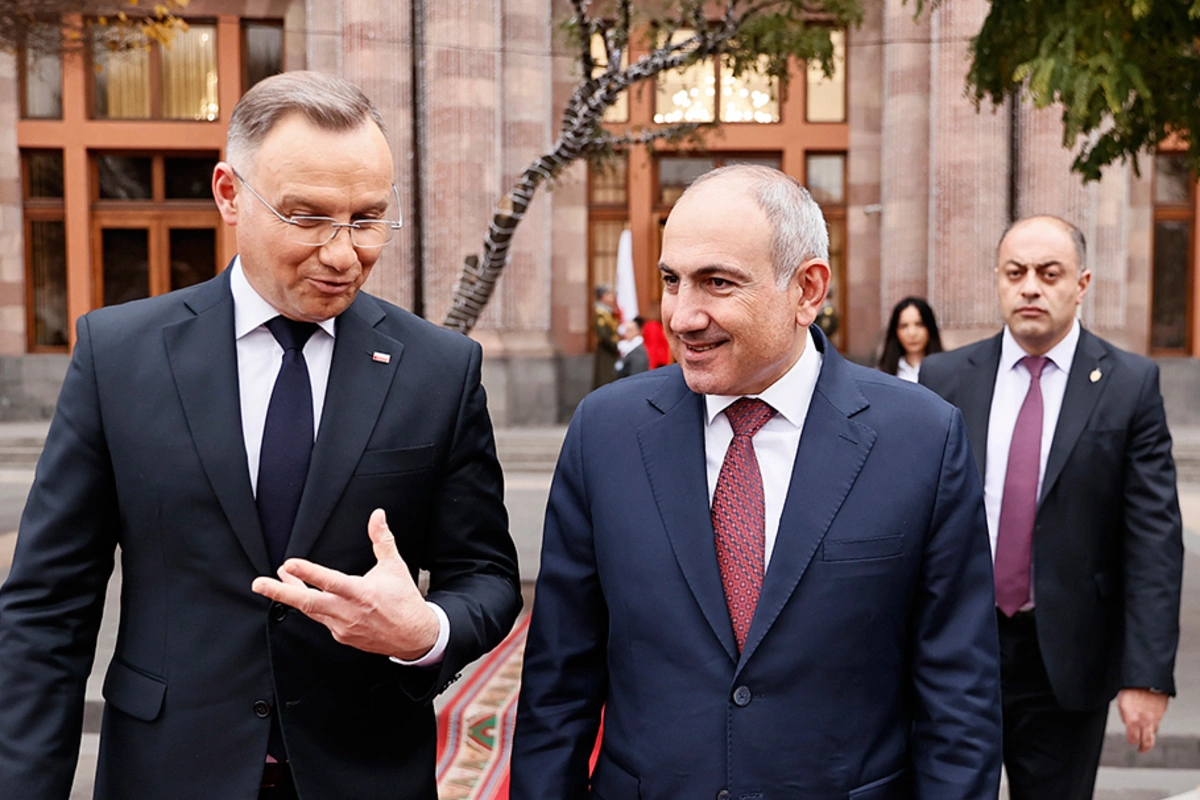
Baku issued a protest against Duda’s visit, describing it as “another demonstration of the anti-Azerbaijani policies of various EU member countries and European institutions.”
Photo: gov.am
On November 25, Polish President Andrzej Duda embarked on a two-day visit to Armenia, during which he participated in a patrol of the EU Mission in Armenia (EUMA) in the northern part of Yerevan’s border with Azerbaijan’s autonomous Nakhchivan exclave. Despite warnings from Baku, Duda visited the border region. In response, Baku summoned the charge d’affaires to protest Duda’s visit near the village of Kerki, accusing the Polish president of engaging in “anti-Azerbaijani propaganda” alongside EUMA staff.
Baku issued a protest against Duda’s visit on the same day, describing it in a statement on X as “another demonstration of the anti-Azerbaijani policies of various EU member countries and European institutions.”
News.Az interviewed Igor Korotchenko, Director General of the Caspian Institute for Strategic Studies, for insights into Duda’s visit to Armenia. The Caspian Post reprints the interview.
– What is the main goal of the visit of Polish President Andrzej Duda to Armenia, and how does it affect regional policy in the South Caucasus?
– Polish President Andrzej Duda likely visited Armenia with provocative intentions. If Warsaw intends to support Armenia, it is within its rights to do so. However, engaging in direct provocations on the border with Azerbaijan—dressing in camouflage, holding binoculars, and attempting to observe alleged violations—is unworthy behavior for a head of state. Such actions may be expected from minor instigators, but not from the president of Poland.
The question arises: who motivated him, and why? It is known that certain Armenian lobbyists, such as former NATO Secretary General Rasmussen, engage in lobbying activities that undermine stability in the South Caucasus. However, Rasmussen is a former official. When the current head of state, in this case the President of Poland, engages in such lobbying and provocations, it raises questions for Polish authorities. Is there a material interest or bribery involved? Heads of state should not behave in this manner.
– What specific tasks does the EU civil-military mission perform on the border between Armenia and Azerbaijan, and what is Baku’s reaction to their presence?
– The EU civil-military mission on the Armenia-Azerbaijan border primarily engages in subversive and intelligence activities. I have repeatedly noted that the core of this European observation mission comprises career employees of Western intelligence services. Their activities are expanding, with more support points established on Armenian territory. These serve as legal bases for intelligence operations and the recruitment of agents among Armenians.
In general, the EU mission's activities aim to prepare for the deployment of NATO military contingents in Armenia. This would likely lead to the removal of Russia's military base from Armenian territory, following the withdrawal of Russian border guards, who have already been removed from key positions such as Yerevan International Airport.
– Why is the US CIA interested in distancing Armenia from Russia, and what tools do they use to achieve this goal?
– The US CIA is the primary agency for covert operations aimed at weakening America's adversaries while consolidating its influence. Notably, the largest US embassy in the post-Soviet space operates in Yerevan, employing over a thousand staff members. Their primary goal is to make Armenia’s Western alignment irreversible.
The Russian Foreign Intelligence Service has warned that the US will intensify its efforts in Armenia, including financing loyal political parties to ensure Armenia’s commitment to its Western trajectory. This is a dangerous development. The South Caucasus countries must work together to counter American expansion and ensure that Armenia adopts a constructive approach rather than engaging in provocations orchestrated by Washington.
– How does Armenian-Polish cooperation affect Armenia’s relations with its neighbors, particularly Azerbaijan and Russia?
– Armenian-Polish cooperation, like Yerevan’s partnerships with the US, France, and the Netherlands, undermines peace and stability in the South Caucasus. Armenia is being turned into a "Trojan horse," positioned against Russia and Azerbaijan. Warsaw, under President Andrzej Duda, is actively provoking and encouraging Armenia’s
destructive role in the region, further destabilizing the South Caucasus.
– Could the presence of a European mission on the border be seen as an instrument of geopolitical pressure on Russia and Azerbaijan?
– I would not characterize the EU observer mission as a significant instrument of geopolitical pressure on Russia and Azerbaijan. While it engages in reconnaissance and provocations, its role should not be overstated. It is more accurate to describe its activities as petty provocations rather than a broader geopolitical strategy.
Russian officials have consistently condemned the EU observer mission’s actions, with Moscow maintaining that it harms peace and progress in the South Caucasus.
Share on social media